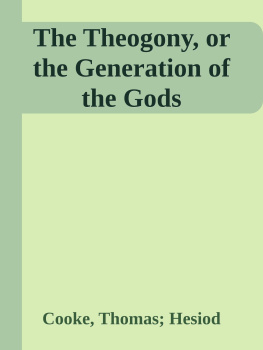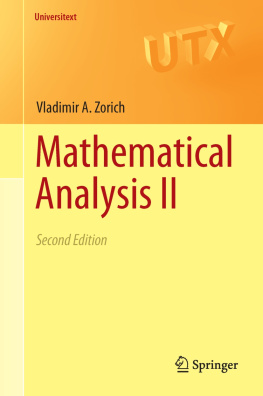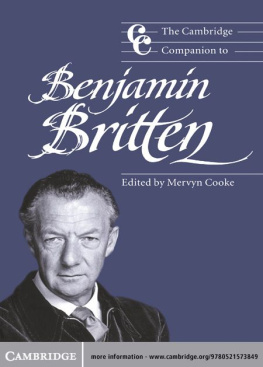Cooke Thomas - The Theogony, or the Generation of the Gods
Here you can read online Cooke Thomas - The Theogony, or the Generation of the Gods full text of the book (entire story) in english for free. Download pdf and epub, get meaning, cover and reviews about this ebook. genre: Detective and thriller. Description of the work, (preface) as well as reviews are available. Best literature library LitArk.com created for fans of good reading and offers a wide selection of genres:
Romance novel
Science fiction
Adventure
Detective
Science
History
Home and family
Prose
Art
Politics
Computer
Non-fiction
Religion
Business
Children
Humor
Choose a favorite category and find really read worthwhile books. Enjoy immersion in the world of imagination, feel the emotions of the characters or learn something new for yourself, make an fascinating discovery.
- Book:The Theogony, or the Generation of the Gods
- Author:
- Genre:
- Rating:5 / 5
- Favourites:Add to favourites
- Your mark:
- 100
- 1
- 2
- 3
- 4
- 5
The Theogony, or the Generation of the Gods: summary, description and annotation
We offer to read an annotation, description, summary or preface (depends on what the author of the book "The Theogony, or the Generation of the Gods" wrote himself). If you haven't found the necessary information about the book — write in the comments, we will try to find it.
The Theogony, or the Generation of the Gods — read online for free the complete book (whole text) full work
Below is the text of the book, divided by pages. System saving the place of the last page read, allows you to conveniently read the book "The Theogony, or the Generation of the Gods" online for free, without having to search again every time where you left off. Put a bookmark, and you can go to the page where you finished reading at any time.
Font size:
Interval:
Bookmark:
THE THEOGONY, OR THE Generation of the Gods.: By Mr. Cooke. The Second Edition
Auteur: Cooke, Thomas; Hesiod.
THE THEOGONY, OR THE Generation of the Gods. To the most honourable GEORGE Marquess of Annandale . The ARGUMENT . After the proposition, and invocation, the poet begins the generation of the gods. This poem, besides the genealogy of the deitys and heros, contains the story of Heaven and the conspiracy of his wife and sons against him, the story of Styx and her offsprings, of Saturn and his sons, and of Prometheus and Pandora: hence the poet proceeds to relate the war of the gods, which is the subject of above three hundred verses. The reader is often relieved, from the narrative part of the Theogony, with several beautyful descriptions, and other poetical embellishments. Begin , my song, with the melodious nine Of Helicon the spacious and divine; The Muses there, a lovely choir, advance, With tender feet to form the skilful dance,
Now round the sable font in order move, Now round the altar of Saturnian Jove ; Or, if the cooling streams to bathe invite, In thee, Permessus , they awhile delight; Or now to Hippocrene resort the fair, Or, Olmius , to thy sacred spring repair.
Veild in thick air, they all the night prolong, In praise of gis -bearing Jove the song; And thou, O Argive Juno , golden shod, Art joind in praises with thy consort god; Thee, goddess, with the azure eyes, they sing, Minerva , daughter of the heavnly king; The sisters to Apollo tune their voice, And, Artemis , to thee whom darts rejoice; And Neptune in the pious hymn they sound, Who girts the earth, and shakes the solid ground; A tribute they to Themis chast allow, And Venus charming with the bending brow, Nor Hebe , crownd with gold, forget to praise, Nor fair Dione in their holy lays; Nor thou, Aurora , nor the Days great light , Remain unsung, nor the fair lamp of Night ; To thee, Latona , next the numbers range; Ipetus , and Saturn wont to change,
They chant; thee, Ocean , with an ample breast, They sing, and Earth , and Night in sable dressd; Nor cease the virgins here the strain divine; They celebrate the whole immortal line. Erewhile as they the shepherd swain behold Feeding, beneath the sacred mount, his fold, With love of charming song his breast they fird; There me the heavnly Muses first inspird; There, when the maids of Jove the silence broke, To Hesiod thus, the shepherd swain, they spoke.
Shepherds attend, your happyness who place In gluttony alone, the swains disgrace; Strict to your duty in the field you keep, There vigilant by night to watch your sheep; Attend ye swains on whom the Muses call, Regard the honour not bestowd on all;
Tis our to speak the truth in language plain, Or give the face of truth to what we feign.
So spoke the maids of Jove , the sacred nine, And pluckd a scepter from the tree divine, To me the branch they gave, with look serene, The laurel ensign, never fading green: I took the gift with holy raptures fird, My words flow sweeter, and my souls inspird; Before my eyes appears the various scene Of all that is to come, and what has been. Me have the Muses chose, their bard to grace, To celebrate the blessd immortal race; To them the honours of my verse belong; To them I first and last devote the song:
But where, O where, inchanted do I rove, Or oer the rocks, or thro the vocal grove!
Now with thharmonious nine begin, whose voice Makes their great sire, olympian Jove , rejoice; The present, future, and the passd, they sing, Joind in sweet concert to delight their king; Melodious and untird their voices flow; Olympus echos, ever crownd with snow.
The heavnly songsters fill ththereal round; Jove s palace laughs, and all the courts resound: Soft warbling endless with their voice divine, They celebrate the whole immortal line: From Earth , and Heavn , great parents, first they trace The progeny of gods, a bounteous race; And then to Jove again returns the song, Of all in empire, and command, most strong; Whose praises first and last their bosom fire, Of mortals, and immortal gods, the sire: Nor to the sons of men deny they praise, To such as merit of their heavnly lays;
They sing the giants of puissant arm, And with the wondrous tale their father charm.
Mnemosyne , in the Pierian grove, The scene of her intrigue with mighty Jove , The empress of Eleuther , fertile earth, Brought to olympian Jove the Muses forth; Blessd offsprings, happy maids, whose powrful art Can banish cares, and ease the painful heart.
Absent from heavn, to quench his amrous flame, Nine nights the god of gods compressd the dame. Now thrice three times the moon concludes her race, And shews the produce of the gods embrace, Fair daughters, pledges of immortal Jove , In number equal to the nights of love; Blessd maids, by harmony of temper joind; And verse, their only care, employs their mind. The virgin songsters first beheld the light Near where Olympus rears his snowy height; Where to the maids fair stately domes ascend, Whose steps a constant beauteous choir attend. Not far from hence the Graces keep their court, And with the god of love in banquets sport; Meanwhile the nine their heavnly voices raise To the immortal powrs, the song of praise; They tune their voices in a sacred cause, Their theme the manners of the gods, and laws: When to Olympus they pursue their way, Sweet warbling, as they go, the deathless lay,
Measring to Jove , with gentle steps, the ground, The sable earth returns the joyful sound. Great Jove , their sire, who rules ththereal plains, Confirmd in powr, of gods the monarch reigns; His father Saturn hurld from his command, He grasps the thunder with his conquring hand; He gives the bolts their vigour as they fly, And bids the red-hot lightning pierce the sky; His subject deitys obey his nod, All honours flow from him of gods the god; From him the Muses sprung, no less their sire, Whose attributes the heavnly maids inspire: Clio begins the lovely tuneful race, Melpomene which, and Euterpe , grace,
Terpsichore all joyful in the choir, And Erato to love whose lays inspire; To these Thalia and Polymnia join, Urania , and Calliope divine, The first, in honour, of the tuneful nine; She the great acts of virtuous monarchs sings, Companion only for the best of kings. Happy of princes, foster sons of Jove , Whom at his birth the nine with eyes of love Behold; to honours they his days design; He first among the scepterd hands shall shine; Him they adorn with evry grace of song, And soft persuasion dwells upon his tongue; To him, their judge, the people turn their eye, On him for justice in their cause rely,
Reason alone his upright judgement guides, He hears impartial, and for truth decides; Thus he determines from a sense profound, And of contention heals the poysnous wound. Wise kings, when subjects grow in faction strong, First calm their minds, and then redress their wrong, By their good counsels bid the tumult cease, And sooth contending partys into peace; His aid with duteous revrence they implore, And as a god their virtuous prince adore: From whom the Muses love such blessings flow, To them a righteous prince the people owe. From Jove , great origin, all monarchs spring, From mighty Jove of kings himself the king; From the Pierian maids, the heavnly nine, And from Apollo , sire of verse divine,
Far shooting deity whose beams inspire, The poets spring, and all who strike the lyre. Blessd whom with eyes of love the Muses view, Sweet flow his words, gentle as falling dew. Is there a man by rising woes oppressd, Who feels the pangs of a distracted breast, Let but the bard, who serves the nine, rehearse The acts of heros passd, the theme for verse, Or if the praise of gods, who pass their days In endless ease above, adorns the lays, The powrful words administer relief, And from the wounded mind expel the grief; Such are the charms which to the bard belong, A gift from gods derivd, the powr of song.
Next pageFont size:
Interval:
Bookmark:
Similar books «The Theogony, or the Generation of the Gods»
Look at similar books to The Theogony, or the Generation of the Gods. We have selected literature similar in name and meaning in the hope of providing readers with more options to find new, interesting, not yet read works.
Discussion, reviews of the book The Theogony, or the Generation of the Gods and just readers' own opinions. Leave your comments, write what you think about the work, its meaning or the main characters. Specify what exactly you liked and what you didn't like, and why you think so.








